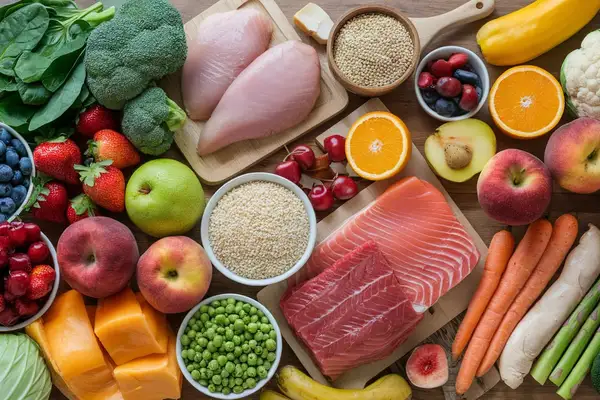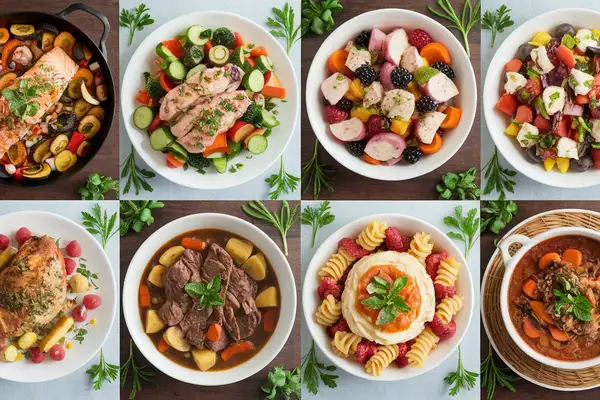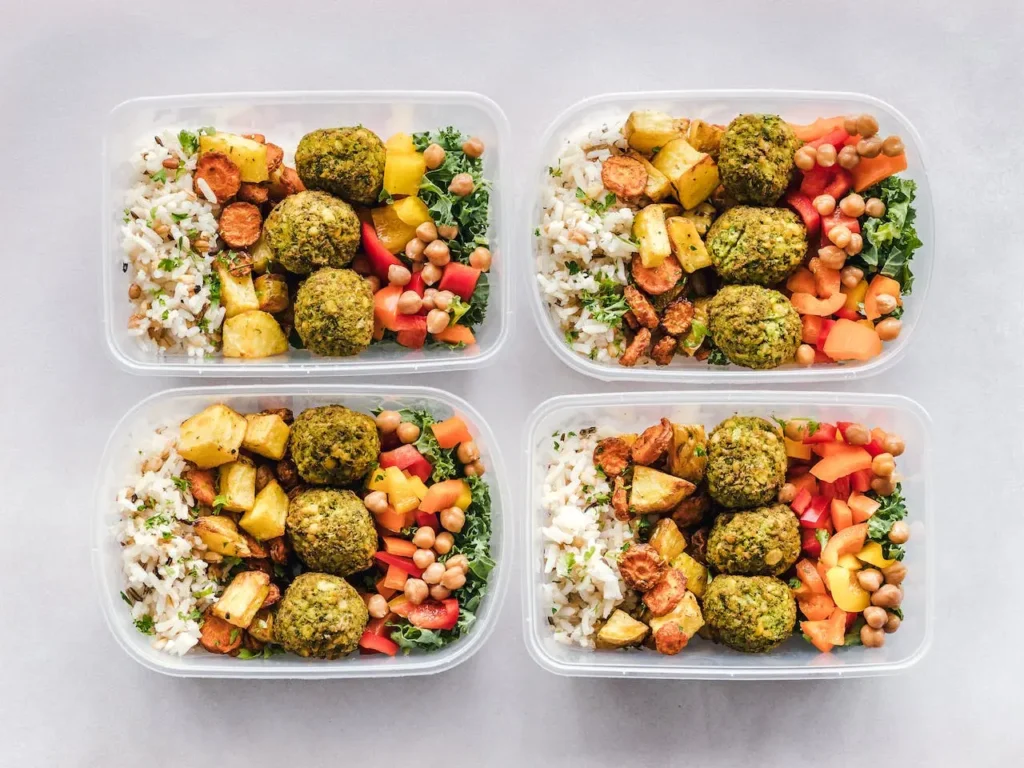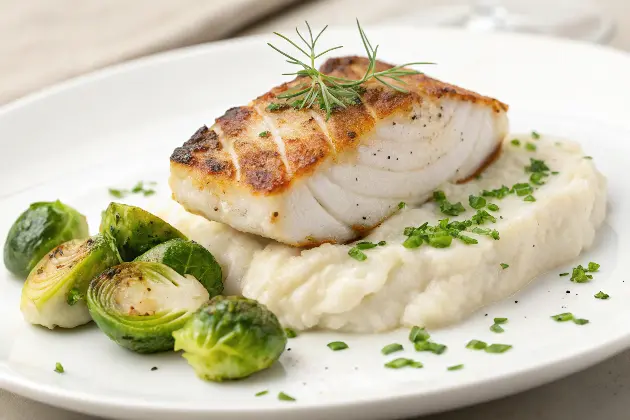3000 Calorie Meal Plan: 7 Day Meal Plan For Muscle Gain
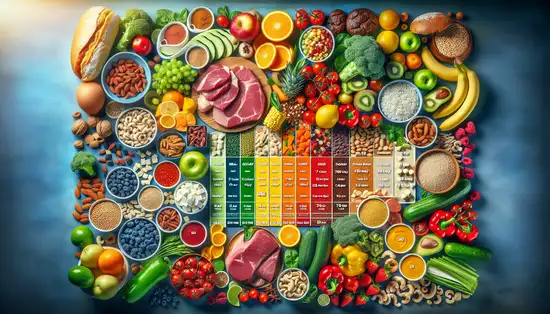
- What is a 3000 Calorie Meal Plan?
- Macronutrient Breakdown of the 3000 Calorie Meal Plan
- 7-Day 3000 Calorie Meal Plan for Muscle Gain (Bulking Diet)
- Foods to Include in a 3000 calorie Meal Plan
- Foods to Avoid in a 3000 Calorie Meal Plan
- Benefits of a 3000 Calorie Meal Plan
- Muscle Gain Supplements
- Resources
- Conclusion
- Frequently Asked Questions (FAQs)
What is a 3000 Calorie Meal Plan?
This post may contain affiliate links, meaning I may earn a commission if you make a purchase, at no extra cost to you. I only recommend products I trust. Thank you for your support.
A 3000 calorie meal plan is a structured daily eating plan designed to provide approximately 3000 calories a day, typically used for muscle gain, bulking, or weight maintenance for highly active individuals.
A 3000 calorie diet includes a balance of macronutrients, proteins, complex carbohydrates, and healthy fats to support energy needs, muscle growth, and recovery.
Experts like Mike Roussell, Ph.D., suggest an ideal macronutrient ratio for muscle building to be 40% carbohydrates, 30% protein, and 30% fat.
For effective muscle gain, it is advised to consume fast-acting grain and starch-based carbohydrates earlier in the day, gradually increasing the intake of fats and vegetables towards the evening, while maintaining a consistent protein intake across all meals.
This 3000 calorie high protein meal plan is pivotal for those whose daily activities demand a robust energy intake, including bodybuilders, athletes, or those with high caloric needs.
Macronutrient Breakdown of the 3000 Calorie Meal Plan
Understanding the optimal macronutrient distribution is crucial for a 3000 calorie meal plan aimed at muscle gain.
The recommended balance typically ranges from:
- 40-60% carbohydrates (approximately 259g)
- 25-35% protein (approximately 292g)
- 15-25% fats (approximately 69g)
This setup ensures a calorie surplus to fuel both workouts and recovery, while providing sufficient protein for muscle growth and repair.
7-Day 3000 Calorie Meal Plan for Muscle Gain (Bulking Diet)
This 7-day 3000 calorie meal plan is designed to support effective bulking by providing nutrient dense high protein meals that fuel muscle growth, enhance recovery, and help you meet your calorie and macronutrient goals.
This muscle gain meal plan includes high calorie high protein meals packed with healthy fats and complex carbohydrates to fuel intense workouts, support muscle recovery, and promote consistent bulking.
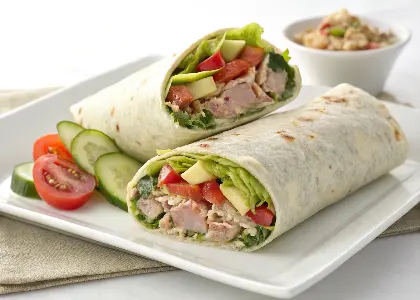
Day 1
Breakfast:
- Scrambled eggs, avocado, and smoked salmon on toast (2 large eggs, 1/2 avocado, 2 slices of whole wheat bread, 2 oz chinook salmon)
- Yogurt with pumpkin & cinnamon (8 oz nonfat Greek yogurt, 1/2 cup of canned pumpkin)
Lunch:
- Tangy tuna salad wrap (165g tuna, 1 oz nonfat Greek yogurt, 1 carb savvy tortilla)
- Cucumber avocado caprese salad with balsamic vinegar (1 large cucumber, 1/2 avocado, 15 cherry tomatoes)
Dinner:
- Sun-dried tomato and mushroom pasta (4 oz whole wheat pasta, 1 small zucchini, 1/2 cup marinara sauce, 1 cup of sun-dried tomatoes)
- Blue cheese and veggie salad (2 cups of shredded lettuce, 1/2 cup of cherry tomatoes, 3 cubic inch of blue cheese)
Snack:
- Apple sandwiches with almond butter & granola (1/4 cup of granola with almonds)
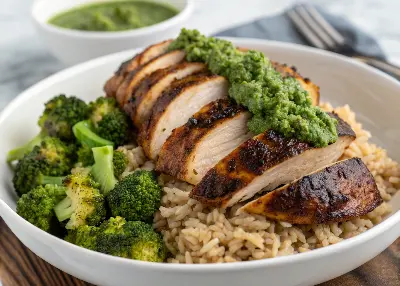
Day 2
Breakfast:
- Blueberry cheesecake oatmeal (3/4 cup oatmeal, 111g blueberries)
- Yogurt and pineapple (8 oz of nonfat Greek yogurt, 1 cup sliced pineapple)
Lunch:
- Raspberries and blackberries protein smoothie (2 cups of nonfat milk, 1/2 cup of berries, 2 scoops of muscle milk protein powder chocolate)
- Bean sprout and spinach salad (2 cups of spinach, 1 cup of mung beans, 2 tbsp vinegar and olive oil)
Dinner:
- Basic turkey, brown rice, and broccoli (1 cup of brown rice, 7 oz turkey breast, 2 cups broccoli, 1/3 cup of light whipping cream fluid)
- Simple spinach salad (3 cups of spinach, 2 large scallions, 1 tbsp olive oil)
Snack:
- Summer pepper and tomato salad with balsamic vinegar (2 large whole tomatoes, 1 medium red bell pepper, 2 tbsp olive oil)
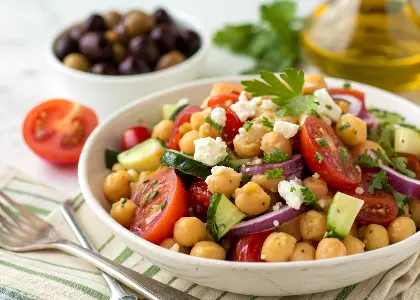
Day 3
Breakfast:
- Spinach, onion, mushroom, and bell pepper egg white omelet (2 cups of egg white, 1 cup of sliced mushrooms, 1/2 cup spinach, 1/4 cup orange bell pepper)
- Cherry berry protein smoothie (1 cup of whole milk, 1 cup of sweet cherries, 1 cup of raspberries, 1 oz almonds, 1 scoop of protein powder)
Lunch:
- Greek chickpea salad (7 oz chickpeas, 2 oz feta cheese, 1 cup of sliced cucumbers)
- Yogurt and mango (8 oz of nonfat Greek yogurt, 1 cup of sliced mangoes)
Dinner:
- Fruit and fiber chicken salad (1/2 tbsp coconut oil, 1/4 cup of barley, 1 oz of pecans, 1 tbsp flaxseeds, 4 oz of chicken breast, 4 cups of lettuce)
- Broccoli with hummus and sesame seeds (2 cups of chopped broccoli, 1/4 cup hummus, 1 tsp sesame seeds)
Snack:
- Maple vinaigrette couscous salad (3/4 tsp Dijon mustard, 1 oz feta cheese, 90g of chickpeas)
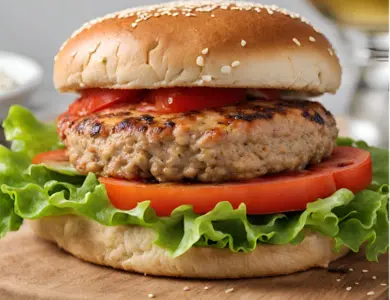
Day 4
Breakfast:
- Scrambled eggs with spinach, bell peppers, and feta cheese, served with whole-grain toast (2 large eggs, 2 slices whole grain toast, 1/4 feat cheese)
- Mixed berry morning smoothie (1 cup of low-fat milk, 1/2 medium banana, 1 cup spinach)
Lunch:
- Black bean stuffed bell peppers with a side of mixed greens (1/2 cup of cooked beans)
- Grilled chicken breast with quinoa pilaf and roasted vegetables (4 oz chicken breast, 1 cup of cooked quinoa)
Dinner:
- Microwave sour cream baked potato (1 large potato, 1 tbsp butter, 1 tbsp sour cream)
- Turkey burger with whole wheat bun, lettuce, tomato, and 1 tablespoon of ketchup, with 1 cup of mixed greens and 2 tablespoons of vinaigrette (284g ground turkey, 2 rolls mixed grain hamburger bun)
Snack:
- 15 almonds and 1/4 cup of dried cranberries
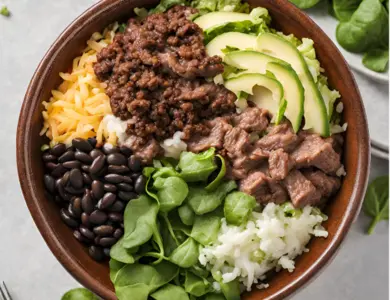
Day 5
Breakfast:
- 2 whole grain waffles with 1/2 cup of mixed berries and 2 tablespoons of maple syrup
- Cherry berry protein smoothie (1 cup of whole milk, 1 oz almonds, 1 cup of raspberries)
Lunch:
- 6 oz chicken breast, 1 medium-sized sweet potato, 3/4 cup of green beans, and 1 ounce of nuts
- Lemon steamed broccoli (170g of broccoli, 3/4 tsp of olive oil)
Dinner:
- Burrito bowl with 6 ounces of chopped sirloin steak, 1/2 cup of black beans, 1 cup of shredded lettuce and spinach, and 2 tablespoons of salsa
- Brown rice (1/2 cup)
Snack:
- 1 granola bar, 1 piece of fruit, and 2 pieces of string cheese
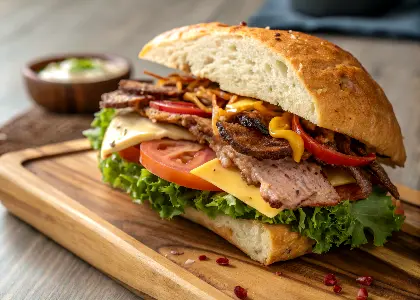
Day 6
Breakfast:
- Smoothie made with 2 cups of dairy or plant-based milk, 1 cup of yogurt, 1 cup of blueberries, and 2 tablespoons of almond butter
Lunch:
- 12-inch sub sandwich with meat, cheese, and veggies, with 3 ounces of baby carrots, 2 tablespoons of hummus, and apple slices on the side
- Red-eye protein parfait (1 cup of nonfat Greek yogurt, 40.7g granola, 1/4 cup blue berries)
Dinner:
- Lentil pasta, 2 tablespoons of pesto, and 12 Brussels sprouts roasted in 1 tablespoon of olive oil (one and a half cups of lentil pasta)
- Banana, almond butter, and dates (1 medium banana, 2 tsp almond butter, 1/2 oz dates)
Snack:
- Simple caprese sandwich (1 slice of large sourdough bread, 1 oz of mozzarella cheese, 2 slices of tomatoes)
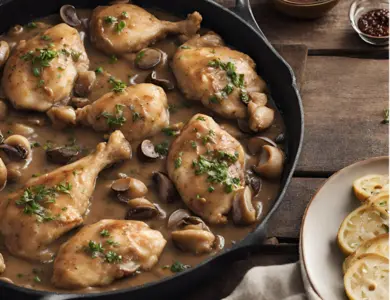
Day 7
Breakfast:
- Vegetable 3 egg scramble (1 cup of mixed vegetables, 3 extra large eggs, 1 tbsp butter)
- Cottage cheese and strawberries (1/2 cup of sliced strawberries, 1cup of low fat cottage cheese)
Lunch:
- Turkey, ham, and avocado on rye (2 slices rye bread, 3 slices deli cut turkey, 1 sliced ham, 1/4 avocado)
- Coco bongo protein shake (1/2 cup of coconut milk, 1/2 banana, 30g of protein powder)
Dinner:
- Chicken Marsala (2 chicken breasts, 1 cup of oyster mushrooms, 1 tsp of wheat flour, 2 tbsp of chicken broth)
- Simple spinach salad (3 cups of spinach, 2 large scallions, 1 tbsp olive oil)
Snack:
- Chocolate avocado smoothie (1/2 cup unsweetened soy milk, 1/2 tbsp of flaxseeds, 1/3 tbsp of chia seeds, 1 scoop of protein powder, 1/2 avocado)
Foods to Include in a 3000 calorie Meal Plan
In a 3000 calorie muscle gain meal plan, it’s important to include a variety of foods that are rich in protein to support muscle growth and recovery.
Here are some examples of foods to include in a 3000 calorie meal plan for muscle gain:
1. Protein Sources
- Lean Meats: Chicken breast, turkey, lean cuts of beef, and pork tenderloin.
- Fish: Salmon, tuna, trout, and mackerel are rich in protein and healthy fats.
- Eggs: A versatile protein source that can be included in various meals.
- Dairy: Greek yogurt, cottage cheese, and low-fat cheese are high-protein dairy options.
- Plant-Based Proteins: Tofu, tempeh, edamame, and other soy products, as well as legumes such as lentils, chickpeas, and black beans.
2. High-Protein Carbohydrates
- Quinoa: A complete protein source and a good alternative to traditional grains.
- Brown Rice: Provides a good amount of protein and complex carbohydrates.
- Whole Grain Pasta and Bread: Choosing whole grain options increases the protein content.
- Oats: A source of complex carbs and some protein, which can be included in breakfast or snacks.
3. Healthy Fats
- Nuts and Seeds: Almonds, walnuts, chia seeds, and flaxseeds provide healthy fats and some protein.
- Avocado: Adds healthy fats and creaminess to meals.
- Olive Oil: Use for cooking and in salad dressings to increase healthy fat intake.
4. Fruits and Vegetables
- Berries: Blueberries, raspberries, and blackberries are lower in sugar and higher in fiber.
- Leafy Greens: Spinach, kale, and Swiss chard provide vitamins, minerals, and some protein.
- Broccoli: Contains protein and is a good source of fiber.
5. Snack Options
- Greek Yogurt: A convenient and high-protein snack option.
- Protein Bars: Look for bars with a good balance of protein, carbohydrates, and healthy fats.
- Hard-Boiled Eggs: A quick and easy protein-rich snack.
6. Hydration
- Water: Staying properly hydrated is essential for overall health and optimal muscle function.
Foods to Avoid in a 3000 Calorie Meal Plan
When following a 3000 calorie high protein meal plan, it’s important to be mindful of the foods to limit or avoid in order to optimize health and fitness goals.
By being mindful of these foods and making healthier choices, individuals can better support their fitness and muscle gain goals while promoting overall health and well-being.
Here are some foods to consider avoiding or limiting while preparing a 3000 calorie meal plan:
1. Processed Meats
- Bacon: High in unhealthy fats and sodium.
- Sausages and Hot Dogs: Often high in saturated fats and preservatives.
- Deli Meats: Can be high in sodium and often contain additives.
2. Sugary and Processed Snacks
- Candy and Sweets: These provide empty calories and can lead to energy crashes.
- Pastries and Sweetened Baked Goods: Often high in unhealthy fats and added sugars.
- Potato Chips and Snack Crackers: Typically high in unhealthy fats and low in nutrients.
3. Sugary Beverages
- Sodas: Loaded with added sugars and provide little to no nutritional value.
- Sweetened Teas and Fruit Drinks: Often contain high amounts of added sugars.
4. Fried Foods
- French Fries: High in unhealthy fats and often high in sodium.
- Fried Chicken and Fried Snacks: These are often high in unhealthy fats and can contribute excess calories.
5. High-Sugar Breakfast Cereals
- Sweetened Cereals: Often high in added sugars and low in protein.
6. Highly Processed Foods
- Fast Food Meals: Burgers, fries, and other fast food options are typically high in unhealthy fats and low in quality protein.
- Frozen Meals: Many frozen meals are high in sodium and may contain unhealthy fats and added sugars.
7. Excessive Alcohol
- Beer, Wine, and Spirits: While moderate alcohol consumption may be acceptable for some, excessive alcohol can contribute extra calories and may hinder fitness and recovery goals.
8. Saturated and Trans Fats
- Fatty Cuts of Meat: High in saturated fats.
- Processed Foods with Trans Fats: Check labels for partially hydrogenated oils.
Benefits of a 3000 Calorie Meal Plan
A 3000 calorie meal plan can offer several benefits for muscle gain:
- Supports Muscle Growth: A higher caloric intake provides the necessary energy to fuel muscle repair and growth after workouts, helping to maximize muscle development.
- Promotes Optimal Protein Synthesis: Consuming sufficient calories, especially from protein, aids in the repair and building of muscle fibers, leading to improved muscle gains.
- Prevents Muscle Loss: A calorie surplus helps prevent the body from breaking down muscle tissue for energy, which is common when calories are too low.
- Increases Strength and Power: Extra energy from carbohydrates and healthy fats ensures you’re able to perform better in workouts, boosting strength and power for progressive muscle overload.
- Sustains Energy Levels: Adequate calories ensure sustained energy throughout the day, which helps you stay active and recover better between workouts, reducing fatigue.
- Improves Recovery: Consuming extra calories from nutrient-dense sources helps speed up recovery, minimizing muscle soreness and promoting faster rebuilding of muscle tissues.
- Optimizes Metabolism: A well-balanced 3000 calorie meal plan ensures your metabolism stays active, allowing you to gain lean mass without storing excess fat.
Muscle Gain Supplements
While a well-rounded 3000 calorie meal plan should provide most of the nutrients you need, certain supplements can support your muscle-building goals.
Remember, supplements should complement a healthy diet and training regime, not replace them.
Consider the following:
1. Whey protein
- A convenient source of high-quality protein to supplement your daily intake. For those regularly engaged in strength training, the recommended daily intake of whey protein ranges from 0.36 to 0.45 grams per pound of body weight.
2. Creatine monohydrate
- Creatine enhances muscle performance and strength, particularly during short-duration, high-intensity resistance exercises.
- A typical regimen starts with a loading phase of 0.3 grams per kilogram of body weight per day for 5-7 days, followed by a maintenance phase of 0.03 grams per kilogram per day for 4-10 weeks.
3. Omega-3 fatty acids
- Support joint health, reduce inflammation, and aid in muscle recovery. Consider fish oil or algae-based supplements.
4. Beta-Alanine and Essential Amino Acids (EAAs)
- Beta-Alanine helps increase carnosine levels in the body, aiding muscle contraction and delaying fatigue during workouts, with a recommended dosage of 4-6 grams per day.
5. Vitamin D
- Essential for bone health and muscle function. If you have limited sun exposure, talk to your doctor about supplementation.
6. Multivitamin
- A multivitamin can help fill in potential nutrient gaps in the diet, especially if the calorie intake is high but the variety of foods consumed is limited.
Resources
These resources provide valuable information, recipes, and tools to support your muscle-building journey.
Conclusion
Embarking on a muscle gain journey requires a comprehensive approach, combining disciplined nutrition with rigorous training.
The 3000 calorie meal plan outlined serves as a foundational guide for individuals aiming to increase muscle mass or enhance their athletic performance.
By providing a balanced distribution of macronutrients and a wide array of meal options, this 3000 calorie meal plan not only supports muscle growth but also promotes overall health and well-being.
The significance of such a dietary strategy lies in its ability to fuel the body adequately for both intense workouts and recovery, ensuring that energy levels are optimized and muscle repair is facilitated effectively.
To achieve the best results from a 7 day meal plan for muscle gain, it is essential to monitor progress and adjust dietary intake as necessary.
Personalizing the 3000 calorie meal plan to cater to individual dietary needs, preferences, and health conditions, while consulting with nutritional professionals, can significantly enhance the effectiveness of the regimen.
As such, a 7 day meal plan for muscle gain stands as a crucial tool for those dedicated to transforming their physical health and improving their muscular strength.
Trending weight loss diets:
- 7-day high protein meal plan
- Hormone balancing diet for women
- Low potassium diet for kidney patients
- Insulin resistance diet plan
- Anti-inflammatory diet for endometriosis
- 7-day elimination diet meal plan
- 7-day meal plan for pregnant women
- 7-day PCOS diet meal plan
- Menopause diet 5 day plan to lose weight
- The 90 30 50 diet plan for weight loss
- 7-day bone broth diet plan
- 7-day diet plan for high blood pressure
- Can dogs eat cauliflower?
- What foods increase alkaline phosphatase?
- Beginner intermittent fasting meal plan
- What is chicken meal in dog food?
Frequently Asked Questions (FAQs)
What are effective ways to consume 3,000 calories a day for muscle building?
To consume 3,000 calories a day for muscle building, incorporate a balanced diet of lean proteins, whole grains, healthy fats, fruits, and vegetables. Key food choices include chicken, fish, quinoa, avocados, nuts, and seeds to help reach your caloric target.
Is a 3,000-calorie diet sufficient for bulking up?
A 3,000-calorie diet is suitable for bulking up if your Total Daily Energy Expenditure (TDEE) is below 3,000 calories. This caloric level is also ideal for maintaining weight if you expend approximately 3,000 calories daily.
How can I effectively bulk up in a week?
To bulk up in a week, focus on a diet rich in healthy fats, proteins, and carbohydrates. Plan to eat three to six times a day, adjusting your total calorie intake depending on whether your goal is to bulk up or lean out.
Can women follow a 3000 calorie meal plan for muscle gain?
Yes, women can follow a 3000 calorie meal plan for muscle gain if it aligns with their goals and individual needs.
How long will it take to see results with a 3000 calorie meal plan for muscle gain?
The timeline for seeing results can vary depending on various factors, including your starting point, genetics, training intensity, and consistency.
With a well-structured 3000 calorie meal plan, regular exercise, and proper recovery, you can expect to see noticeable progress within a few months.
